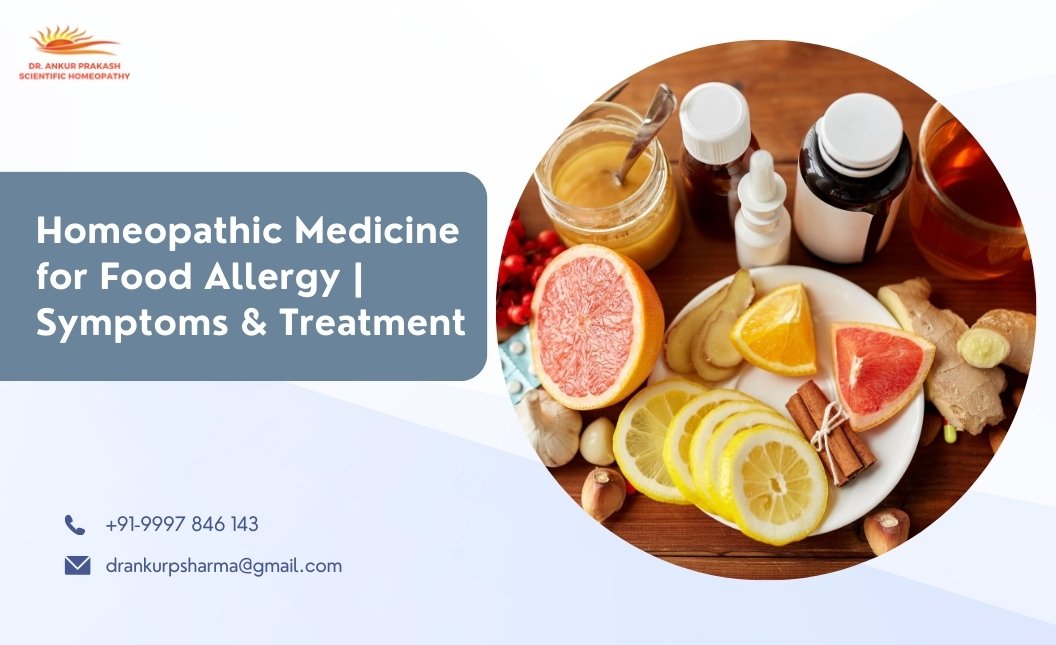Natural Relief: Homeopathic Medicine for Food Allergy
Homeopathic Medicine for Food Allergy offers a gentle yet effective approach to managing and treating allergic reactions caused by foods. By addressing the root cause of the allergy, these natural remedies aim to reduce symptoms such as itching, swelling, and digestive issues. Tailored to individual needs, homeopathic treatment enhances the body’s innate ability to heal, providing a safe alternative for those seeking non-invasive and holistic options. Ideal for individuals of all ages, it supports overall well-being and immune system balance.
What is a Food Allergy?
A food allergy is an immune system reaction that occurs soon after eating a specific food. Even small amounts of the allergen can trigger signs and symptoms such as digestive problems, hives, or swollen airways. In severe cases, a food allergy can cause life-threatening reactions.
What Are the Types of Food Allergies?
IgE-mediated food allergies: This is the most prevalent type, where the body’s immune system produces Immunoglobulin E (IgE) antibodies in response to a food allergen. Reactions are typically immediate and can range from mild to severe, including symptoms like hives, swelling, and anaphylaxis.
Non-IgE-mediated food allergies: These allergies do not involve IgE antibodies but other parts of the immune system. Reactions are generally delayed, occurring several hours to days after consuming the allergen. Symptoms may include skin rash, digestive problems, and respiratory issues.
Mixed food allergies: These involve both IgE and non-IgE mediated responses. Mixed food allergies can cause a range of immediate and delayed symptoms, making them particularly complex to diagnose and manage.
Each type of food allergy has distinct mechanisms and manifestations, requiring tailored approaches for diagnosis and management.
Symptoms of a Food Allergy
Here’s a detailed description of the symptoms associated with food allergies, organized step by step:
Skin Reactions: One of the most common initial signs of a food allergy are skin reactions. These can include red, itchy hives or eczema. The skin may become swollen or irritated, often appearing soon after consuming the allergenic food.
Digestive Symptoms: Digestive disturbances are also frequent with food allergies. Symptoms can include abdominal pain, which may be cramping or sharp, along with diarrhea as the body attempts to eliminate the allergen. Vomiting may also occur as a direct response to irritation in the stomach.
Respiratory Issues: Food allergies can affect the respiratory system, leading to symptoms such as wheezing, nasal congestion, or difficulty breathing. These symptoms arise from the body’s immune response, which can cause inflammation in air pathways.
Anaphylaxis: This is the most severe reaction and is potentially life-threatening. Symptoms of anaphylaxis can include a sudden drop in blood pressure, severe shortness of breath, a rapid pulse, and dizziness or lightheadedness. This condition is an emergency and requires immediate medical intervention.
Causes
Factors that contribute to the development of food allergies:
Genetic Factors: If food allergies are prevalent in a family, there’s a higher likelihood that the next generation will also be prone to food allergies. This genetic predisposition means that the immune system may be more likely to mistakenly identify certain foods as harmful, triggering an allergic reaction.
Early Exposure: The timing of when a child is first exposed to allergenic foods can impact their risk of developing food allergies. Both premature exposure and delayed introduction have been studied for their roles in allergy development, with mixed opinions on optimal timing.
Environmental Factors: Elements such as pollution or changes in eating habits can influence the immune system and potentially lead to food allergies. For instance, a lack of exposure to certain bacteria, which can be a result of excessive cleanliness or antibiotics, might affect immune system maturity and its ability to tolerate allergens.
Understanding these key causes helps in strategizing prevention and treatment approaches for food allergies, aiming to reduce the incidence and severity of allergic reactions.
Food Allergy Cure Homeopathy
Treating food allergies primarily involves avoiding known allergens. It’s essential to completely exclude these foods from your diet and always carry emergency medications, such as epinephrine autoinjectors, to manage accidental exposures and reactions. If you use an epinephrine autoinjector, you should seek immediate emergency medical attention. Wearing medical alert identification that displays your food allergies is also advisable.
Your healthcare provider might also recommend medications to alleviate symptoms of allergic reactions. These medications include:
Epinephrine (e.g., EpiPen® or Auvi-Q), a critical emergency medication that swiftly counters anaphylactic symptoms.
Antihistamines, which help relieve itching or congestion.
Corticosteroids, which are used to diminish severe swelling following an allergic reaction.
Disclaimer: While homeopathic treatments can be effective for managing various conditions, it is crucial to consult with a healthcare professional before beginning any new treatment regimen. If you are considering homeopathic remedies, we strongly recommend seeking advice from the best homeopathy doctor available to ensure safety and appropriateness for your specific health needs.
Prevention
Preventing food allergy involves careful strategies to minimize the risk of developing or exacerbating allergies:
Early Introduction: Introduce potential allergens gradually into infants’ diets as recommended by pediatric guidelines to potentially reduce the risk of developing a food allergy.
Dietary Management: For those already diagnosed, strict avoidance of known allergens is crucial. Carefully read food labels and inquire about ingredients when eating out to prevent accidental exposure.
In conclusion
Managing food allergies, including through Homeopathic Medicine for Food Allergy, requires awareness and careful planning. By understanding the causes, types, and appropriate treatments, individuals can lead safer, healthier lives. Early dietary interventions and consistent vigilance are key in preventing allergic reactions. Always consult healthcare professionals for guidance and support in navigating food allergies with holistic approaches.








